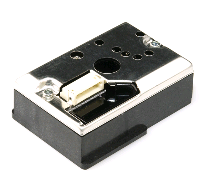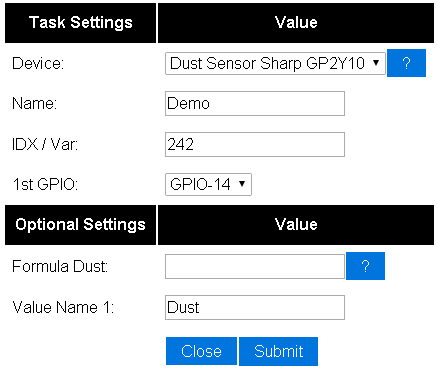Difference between revisions of "GP2Y10"
Jump to navigation
Jump to search
m (Krikk moved page DustSensor to GP2Y10) |
Grovkillen (talk | contribs) m (→Introduction: Added information about PM, dust may get people to think about the general term "dust") |
||
| Line 1: | Line 1: | ||
= Introduction = | = Introduction = | ||
| − | The ESP module can read the Sharp GP2Y10 Dust sensor. | + | The ESP module can read the Sharp GP2Y10 Dust sensor. The general term "dust" should not fool you, the sensor can sense particles of sizes PM2.5 and above. PM stands for Particle Matter and you find more about that [https://www.epa.gov/air-trends/particulate-matter-pm25-trends[here]] and [https://en.wikipedia.org/wiki/Particulates[here]]. |
The input signal needs to be connected to the ADC (also referred as Tout) pin on the ESP module. You should also connect a GPIO pin to the sensor to control the build in LED. | The input signal needs to be connected to the ADC (also referred as Tout) pin on the ESP module. You should also connect a GPIO pin to the sensor to control the build in LED. | ||
Revision as of 08:58, 15 May 2017
Contents
Introduction
The ESP module can read the Sharp GP2Y10 Dust sensor. The general term "dust" should not fool you, the sensor can sense particles of sizes PM2.5 and above. PM stands for Particle Matter and you find more about that [here] and [here].
The input signal needs to be connected to the ADC (also referred as Tout) pin on the ESP module. You should also connect a GPIO pin to the sensor to control the build in LED.
Hardware
Connect the dust sensor to a GPIO pin and the ADC pin.
Software
Custom Sketch
ESP Easy
Use the device tab on the ESP Easy webinterface and create a new task by editing one of the available tasks. Select "Dust Sensor Sharp GP2Y10" from the dropdown box.
Enter the GPIO pin and enter the IDX found in the Domoticz device page. That should be all.

